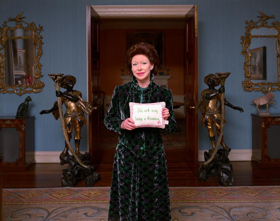Review: A PRINCESS UNDONE, Park Theatre

![]() We're in Apartment 1A, Kensington Palace, 1993 with Princess Michael of Kent flicking the net curtains from across the courtyard and Diana flitting in and out (did the Royals really live like that, like 80's popsters Five Star, all in the same house?) Our heroine, now boozy but surprisingly unbloated, is determined to burn letters packed with intimate secrets with the help of a reluctant courtier, when an old flame turns up and things for the woman who would be King (had she been born with the alternative chromosomes) begin to heat up.
We're in Apartment 1A, Kensington Palace, 1993 with Princess Michael of Kent flicking the net curtains from across the courtyard and Diana flitting in and out (did the Royals really live like that, like 80's popsters Five Star, all in the same house?) Our heroine, now boozy but surprisingly unbloated, is determined to burn letters packed with intimate secrets with the help of a reluctant courtier, when an old flame turns up and things for the woman who would be King (had she been born with the alternative chromosomes) begin to heat up.
PG Wodehouse may have remarked of Freddie Threepwood that there is nothing so useless as the second son of an Earl, but that didn't stop who exactly (The Press, The Establishment, The Church?) from vetoing her marriage to Group Captain Peter Townsend (a divorcé) and condemning her to a life of failed love affairs with unsuitable men. She was 22 and had learned a harsh lesson about just how cruel people can be - what a bunch of bastards.
50 years on, the princess has no husband but plenty of waspish wit and flirtatious charm, albeit floating on a sea of melancholy. A lifetime of having nothing to do except excite salacious gossip and pass the time with distractions has hollowed out her self-esteem, if not her pride, and she cuts a tragic, if not wholly sympathetic figure.
That's a lot to work with, but writer Richard Stirling (who also plays the fussy footman) never quite gets to the heart of his subject. Felicity Dean has plenty of presence and delivers a few vituperative observations on the Royals (ones that, post-Diana and through Private Eye, we've become familiar with) but the all-encompassing ennui tends to flatten the passion of her jibes.
When yobbish ex-lover and ex-con John Bindon (Patrick Toomey) from the Mustique days and nights partying with the Bohemian set, turns up with incriminating photographs and demands for money, the stakes don't seem high enough. As Margaret has told us, and we know, the Golden Girl is the only show in town now and still had four years of her love-hate relationship with the Press to run. If the victim of the blackmail doesn't really care, should we?
A perfect venue, a beautifully observed set by Norman Coates and a central figure worthy of a Shakespearean tragedy and yet the play doesn't fly as it should, too often settling for the in-joke and the smile of recognition that comes with it, rather than exploring the heart of a woman who had it broken early in life and chose to harden it against that ever happening again. Something of a missed opportunity, but nevertheless a sobering reminder of the pain caused by a love forsaken against her will, summed up by this quote from her obituary in the Daily Telegraph.
"I have been aware that subject to my renouncing my rights of succession it might have been possible for me to contract a civil marriage, but mindful of the Church's teaching that Christian marriage is indissoluble, and conscious of my duty to the Commonwealth, I have resolved to put these considerations before any others.
"I have reached this decision entirely alone, and in doing so I have been strengthened by the unfailing support and devotion of Group Captain Peter Townsend. I am deeply grateful for the concern of all those who constantly prayed for my happiness."
Many echoed the view of Harold Nicolson, who wrote of his love and admiration for this "great act of self-sacrifice"; but there was a significant body of dissent which believed, in the words of the Manchester Guardian, that "in the long run it will not redound to the credit or influence of those who have been most persistent in denying the Princess the same liberty that is enjoyed by the rest of her fellow citizens".
Quite.
A Princess Undone continues at the Park Theatre until 17 March.
Reader Reviews

Videos

